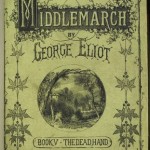It is in Book II that Middlemarch seems to finally move beyond the lengthy introductions to and descriptions of the inhabitants of the town to present some of the kinds of conflict that this little town endures. Although the outsider Dr. Tertius Lydgate wishes to “[c]onfound their petty politics!” I for one deeply enjoyed the nuanced view that Eliot provides into the political underbelly of this small society (169). Quickly entrenched in the middle of the most current issue, Lydgate must reconcile his professional ambitions with his personal opinions in regards to the appointment of a clergyman to Middlemarch’s new hospital. Torn between the only two pastors in the area, Rev. Farebrother and Rev. Tyke, Lydgate’s inner turmoil culminates in a tie-breaking vote that puts him in line with the powerful banker, Mr. Bulstrode.
The presentation of the two reverends revolves mostly around others’ opinions of the men. While Bulstrode clearly favors Rev. Tyke as “a real Gospel preacher,” Mr. Lydgate appreciates Farebrother’s “ingenious and pithy” manner, quickly making friends with the Vicar (174, 168). From Eliot’s presentation of Farebrother, it appears that he should by all accounts win the chaplainship appointment with little resistance. According to the author, he was such a “likeable man” that “[p]eople outside his parish went to hear him” (168). In contrast, “[n]obody had anything to say against Mr. Tyke, except that they could not bear him” (170).
Unfortunately for Farebrother, his overall popularity with the parishioners could not overcome the withering opinions of Mr. Bulstrode, who bends his will to see Tyke appointed. Although Lydgate appears desirous to help out his friend, his own ambitions supersede his friendship and allow him to justify voting for Tyke, a man to whom we as readers have not even been properly introduced. It does seem interesting that Rev. Tyke is not given his own voice during the ordeal. Instead, his defense is left to members of the medical board of infirmary and Mr. Bulstrode, neither of which seem to provide a very strong case in favor of the man. Even his name, Tyke, seems lacking and immature in comparison to that of Farebrother, who lives up to his handle during his gracious loss of the coveted position.
In the end however, it does not matter whether or not the audience gets to judge Rev. Tyke from intimate knowledge or secondhand opinion because the major focus lies on Lydgate’s conundrum. Many people are faced with the juxtaposition of competing desires and must find a way to not only come to a decision but then justify their conclusion. Lydgate’s friendly feelings toward Farebrother may come from a genuine rapport between the two, but he appears to have already made up his mind to align himself with Bulstrode and his man, Tyke. As the newcomer to Middlemarch, Lydgate’s status is essentially at the mercy of those in power, leaving him little actual choice in his decision. If choice is essential to freewill, then at least in this issue, Lydgate was bound to his decision from the start.
Emily Fleishhauer

